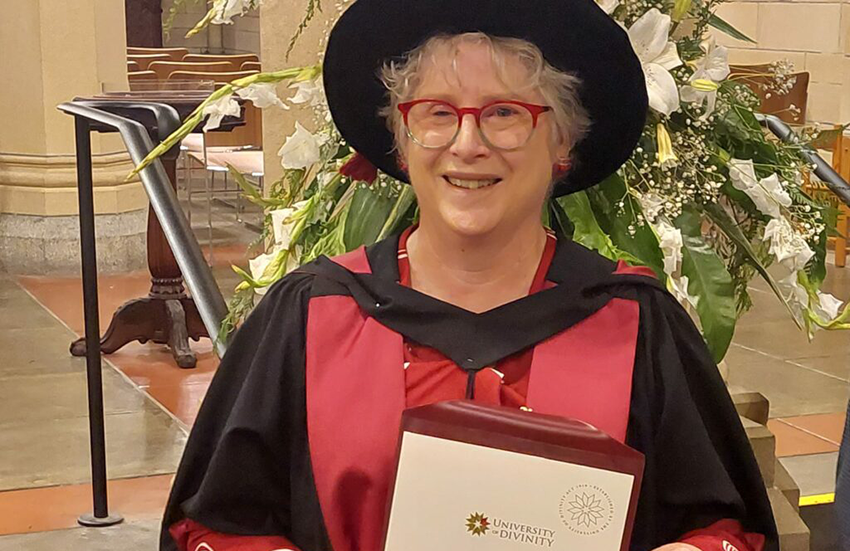Kippax Uniting Church minister Rev. Dr Karyl Davison recently graduated with a DMin, which she studied through the Adelaide College of Leadership and Theology, now part of the University of Divinity.
“The question that led me into this research was, “If we (the church) really believe that Christ is somehow present and experienced in the eucharistic meal, why are we not using it in mission?” That is, if people experience Jesus through eucharistic hospitality, it might just be the start of an exploration towards discipleship,” Rev. Dr Davison said.
“The title of my thesis is “Sacramental Sausages: Freeing the Lord’s supper for mission.” It’s research based on the fresh expression of church I led in Western Australia, the Eaton/Millbridge Community Project (EMCP), which ran, among other things, free community events like an Easter Egg Hunt, Movies in the Park, Christmas and a Spring Fiesta. At each event, we served food and drink.”
“My research sought to explore whether those participating in our events experienced the sacred, or specifically, the giving of food and drink as the Lord’s supper. And if so, would it be a specifically Christian privilege or open to all, regardless of baptismal status.”
“Data from each of the five voices of theology revealed that there have been many changes over time in the practice and theology of the eucharist, some of them simply by chance, some through misunderstanding or neglect. Others, such as those changes made by the UCA, have come about as the result of new understandings and changed circumstances and our church’s commitment to share the gospel to new generations.”
“My own theology of the Lord’s supper draws from my conviction that our eucharist practice look at Jesus’ whole meal ministry not simply on the last meal he ate with his friends. The gospel narratives reveal that Jesus’ most consistent social action was eating with those who were marginalised from the political and religious system of his day.”
“For Jesus, the table was a sign of God’s kingdom, where all were welcome and everyone found a place, even outsiders, sinners, and those regarded as unclean. One meal in particular invites questioning of the church’s practice of excluding those who are not baptised from Jesus’ meal: the feeding of the multitude. It is both radically inclusive and infused with eucharistic images. Importantly it uses the distinctive four-fold action, took, blessed, broke and gave, as the last supper and Jesus’ post resurrection meal at Emmaus indicating that the early church understood these meals were linked.”
“I found that participants did experience the sacred in our events. EMCP team members came to understand the practice of serving of food and drink was a contextual celebration of the Lord’s supper. Six themes emerged from focus group data: grace, thanksgiving, communion, presence, incarnational, and inclusion, these which correlate with Protestant eucharistic theology.”
Rev. Dr Davison told Insights it felt “wonderful” to have her work recognised in a public forum, yet hard to believe it was finished.
“The moment of hearing my abstract read out felt amazing,” she said.
“Yet it was also really incongruous. The graduation was held as part of Evensong at the St John’s Anglican Cathedral in Brisbane with the liturgy almost entirely taken from the 1662 Book of Common Prayer whilst the work I was being awarded for challenges traditional theology and practice and is based on our 21st century context.”
“My chapter on the normative theology of the EMCP drew data from the Basis of Union and other UCA documents relating to the Lord’s supper. These documents are fertile ground for reform and renewal for the sake of mission in the world.”
“Such is the emphasis on mission in the Basis, that Andrew Dutney has argued that mission is the “hermeneutical key to the Basis of Union, and the most important pointer to the Uniting Church’s way of being reformed.”
“This emphasis carries through to its statements on the sacraments. Rather than defining the sacraments, the Basis affirms the significance of the sacraments for the missionary life of the church with the primary concern not what they “are” but what they “do.” It is in their use that Christ “comes, addresses, and deals with people, reaches out to command people’s attention and awaken their faith … and in his own strange way Christ constitutes, rules, and renews them as his Church.”















3 thoughts on “Freeing the Lord’s supper for mission”
I came to Faith through Eucharist , a little like Sara Miles in her book “ Take this Bread”.
Took, blessed, broke, gave , as Jesus did at the Last Supper and at the post Resurrection Meal at Emmaus, is classic Mission that goes beyond needing to understand language. For 20 years, I celebrated Eucharist with people who were addicts, developmentally delayed, mentally very unwell, dementing . To take, bless broke and give to people who were often illiterate, was very welcomed. They knew that Christ was present.So, thank you Rev Dr Karyl Davison, for showing us, again that Eucharist is Mission- where all are welcome. I hope that you are able to encourage others.
Like Christine in her comment, I wish to endorse the emphasis that the Rev Dr Karyl Davison places on the importance of the Eucharist as an instrument of Mission. St Augustine wrote about the Eucharist in these words “Behold who you are; Become what you receive.” Is it because of our adoption of a great familiarity with the observance of the Lord’s Supper that we have lost some of the mystery, and its potential as an outreach of Mission? We need to grasp the potential it offers to reach out to those seeking a meaning in their lives. Thanks, Karyl, for your inspiration.
Good to see this conversation continuing. I just looked up and it was 30 years ago this year (!) that I argued we should be inviting all people to the lord supper, though only in a student essay, not a whole thesis! https://ecofaith.org/oldsite/papers/old_essays/1994%20should%20we%20welcome%20non%20christians%20to%20the%20lord's%20supper.pdf